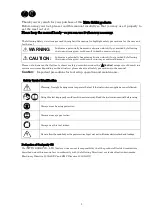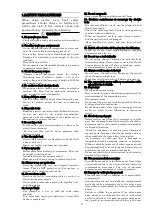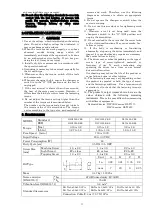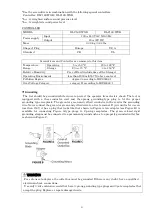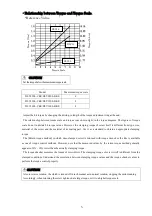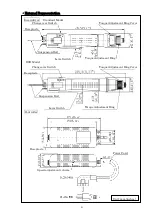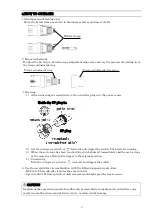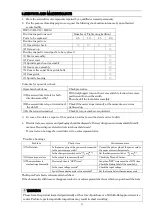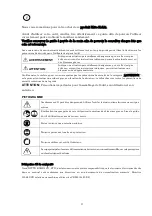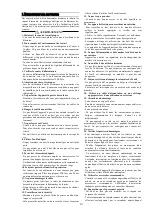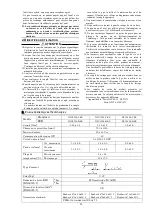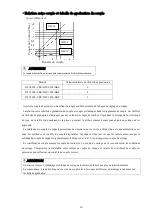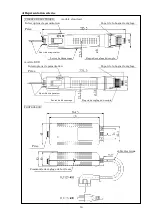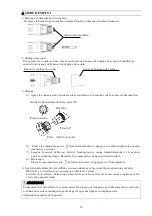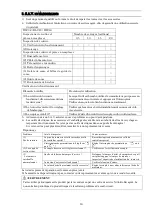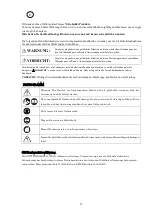
2
1.SAFETY
PRECAUTIONS
When using electric tools, basic safety
precautions should always be followed to
reduce the risk of fire, electric shock and
personal injury, including the following
WARNING
1. Keep work area clean.
・
Cluttered work areas and benches invite accidents
and injuries.
2. Consider work area environment
・
Do not expose the tools or components to water and
rain. Do not use the tools in damp locations.
・
Use a safety device such as Earth-Leakage Circuit
Breaker if it inevitable to power-supply in the wet
condition.
・
Keep work area well lit.
・
Do not operate near flammable liquids or in gaseous
or explosive atmospheres.
3. Check the power source.
・
Operate under the power source the voltage
fluctuating rate of which is within
±
10% of the
rated voltage, and the frequency of which is 50/60Hz
of sinusoidal wave.
4. Be cautious about electric shock.
・
When using electric tools, do not touch any which is
earthed. (Ex. Pipe, heating apparatus, microwave
oven, outside frame of refrigerator)
5. Keep children away.
・
Also all visitors should be kept away from work area.
・
Do not let visitors contact the tool, or connecting
cords.
6. Store idle tools
・
Keep the electric tool away from children when you
do not use, and do not permit unauthorized
personnel, who are unfamiliar to the electric tool or
the manual, to operate the tool.
7. Do not force tool
・
It will do the job better and safer at the rate for
which it was intended.
・
Do not use this tool for other purposes than
fastening screws.
8. Use the right tool
・
Do not use a small tool or attachment to do the job of
a heavy-duty tool.
・
Do not use tool for a purpose not intended.
9. Dress properly
・
Do not wear loose clothing or accessories. They can
be caught in moving parts.
・
Non-skid footwear are recommended.
・
Wear protective hair covering to contain long hair.
10. Always wear eye protection
・
Everyday eyeglasses only have impact resistant
lenses. They do NOT protect eyes. Also use face or
dust mask, if operations create dust.
11. Do not abuse cable
・
Never carry tool by connecting cable or yank it to
disconnect from receptacle.
・
Do not place a cable near a place with high heat, oil ,
and sharp edges.
12. Secure Work
・
Use clamps or a vice to hold the work when
practical.
・
It is safer than using your hand and it frees both
hands to operate tool.
13. Do not overreach
・
Keep proper footing and balance at all times.
14. Cautious maintenance is necessary for electric
tools
・
For safe and efficient work, use the proper bit and
check it regularly.
・
Check the cable regularly. Contact sales agents to
repair it when it is defective.
・
When an extension cable is used, check regularly
and change it when it is damaged.
・
Keep handles dry, clean, and free from oil and
grease.
15. Switch off and take off the plug for the following
・
When not in use, when repairing, when changing
accessories and bits, etc.
16. Do not use a tool violently
・
Do not swing the tool around and hold the body
firmly when using. If not, it may cause injury. Do not
drop or abuse the body. If there is breakage, cracks,
or transformation, it may cause injury.
17. Always avoid unexpected start
・
Do not carry the tool with a finger on the switch
when the power supply is on.
Make sure that the switch is off before plugging in.
18. Use appropriate power cable or an extension cable
when it is used outside.
19. Start alert
・
Watch what you are doing.
・
Bear in mind the way of handling/operation and the
circumstances of the surrounding area.
・
Use common sense.
・
Do not use when you are tired or under the influence
of drugs, alcohol or medication.
・
Do not bring hand or face close to moving parts such
as bit etc. when in use. Otherwise, it may cause
injury.
20. Check damaged parts
・
Before further use of the tool, an accessory or other
part that is damaged should be carefully checked to
determine that it will operate properly and perform
its intended functions.
・
Check for alignment of moving parts, binding of
moving parts, breakage of parts, mounting and any
other conditions that may affect its operation.
・
An accessory or other part that is damaged or
inoperable should be properly repaired or replaced.
When a switch becomes out of order, repairs should
be performed only by the sales agent from whom you
purchased the tool or an authorized dealer.
・
Do not use electric tools which cannot be activated or
stopped with a switch.
21. Use recommended accessories
・
Consult this manual or the sales agent from whom
you purchased the tool or an authorized dealer for
recommended accessories. The use of improper
accessories may cause risk of injury to persons.
22. Repairs by authorized personnel
・
This tool should not be modified as it meets safety
requirements.
・
Any repairs to the tool or installation of replacement
parts should be performed only by the sales agent
from whom you purchased the tool or an authorized
dealer.
・
Failure to utilize the expertise of the sales agent
from whom you purchased the tool or authorized
dealer or, failure to use genuine replacement parts,
may result in an increased risk of injury to the user


